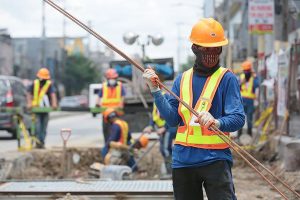
20 PPP projects up for ICC approval
ABOUT 20 public-private partnership (PPP) projects under the government’s flagship infrastructure program are expected to be submitted to the National Economic and Development Authority-Investment Coordination Committee (NEDA-ICC) for approval this year, the PPP Center said on Thursday.
“Of the 182 projects in the priority infrastructure program, around 45 are PPPs,” PPP Center Executive Director Ma. Cynthia C. Hernandez said at a press briefing after the ceremonial signing of the implementing rules and regulations (IRR) of Republic Act No. 11966 or the PPP Code. “These are in various stages of development, some are being assisted by the PPP Center as well to go through the solicited route.”
“I think within the year, a substantial number of those would be submitted to NEDA, around 20 (will be) submitted to NEDA, to the ICC.”
Once a project is approved by the ICC, it will then be submitted to the NEDA board chaired by President Ferdinand R. Marcos, Jr., for final confirmation.
Ms. Hernandez said the PPP Center has also received and processed about 20 unsolicited PPP projects since the PPP Code was signed into law in December.
The law addresses the bottlenecks that have hampered the implementation of PPP projects.
“This PPP Code provides clarity to many of the ambiguous provisions of the Build-Operate-Transfer law, and so it makes the governance of the PPP more clear,” NEDA Secretary Arsenio M. Balisacan said.
There are 119 PPP projects in the pipeline worth P2.4 trillion, according to NEDA. Of these, 95 are national projects, while 24 are local projects. Most of these projects are in the “physical and digital connectivity phases as well as property development.”
“PPPs will allow us to tap the private sector’s valuable experiences, expertise and financial resources to advance the country’s socioeconomic agenda and development initiatives,” Mr. Balisacan said. “We are in a hurry to get strategic investments to increase our economy’s growth potential.”
Under the law, PPP projects above the P15-billion threshold will still be submitted to the NEDA board, while those below the threshold that do not require government subsidy will be sent to the implementing agency.
Projects that require government subsidy must be sent to the NEDA ICC, while local projects go under their respective councils.
“That, in a sense, can also diminish the number of PPP projects going to the NEDA board, and that’s part of the streamlining that we are pushing,” Mr. Balisacan said.
PPP Center Deputy Executive Director Jeffrey I. Manalo noted that under the law, PPP projects must be approved within 120 days.
“What the law and the IRR did actually was to lay down the processes from development all the way to the actual contract signing and even during the implementation,” he said. “Those steps that didn’t have a timeline before now have deadlines, so that all implementing agencies are guided.”
Mr. Manalo said the law also provides a unified legal framework for all entities that want to enter into a PPP with the government.
“Prior to the PPP Code, even the PPP Center didn’t know the number of laws that could be used to enter into public-private partnerships. So, under this code, we have unified it into a single framework, so any government entity who wants to use it, who wants to enter into a PPP, will have to use the law and the processes in the IRR.” — BMDC



